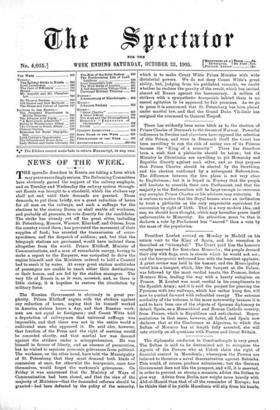The Russian Government is obviously in great per- plexity. Prince
Khilkoff argues with the strikers against any reduction of hours, saying that he himself worked in America sixteen hours a day, and that Russian work- men are not equal to foreigners ; and Count Witte told a deputation of railwaymen that universal suffrage was impossible, and that there was not in the entire world a cultivated man who approved it. He said also, however, that freedom of the Press and the right of meeting would be conceded shortly, and that martial law was decreed against the strikers under a misapprehension. He was himself in favour of liberty, and an absence of persecution, but he wished to separate economic grievances from political. The workmen, on the other hand, have told the Municipality of St. Petersburg that they must demand both kinds of concession at once, for otherwise the bourgeoisie, once free themselves, would forget the workmen's grievances. On Friday it was announced that the Ministry of Ways of Communication bad been closed, and that the view of the majority of Ministers—that the demanded reforms should be granted—had been defeated by the policy of the minority, which is to make Count Witte Prime Minister with wide dictatorial powers. We do not deny Count Witte's great ability, but, judging from his published remarks, we doubt whether he realises the gravity of the revolt, which has incited almost all Russia against the bureaucracy. A million of strikers with a sympathetic bourgeoisie behind them is no casual agitation to be appeased by fair promises. As we go to press it is announced, that St. Petersburg has been placed under martial law, and that the Grand Duke Vladimir has resigned the command to General Trepoff.


















































